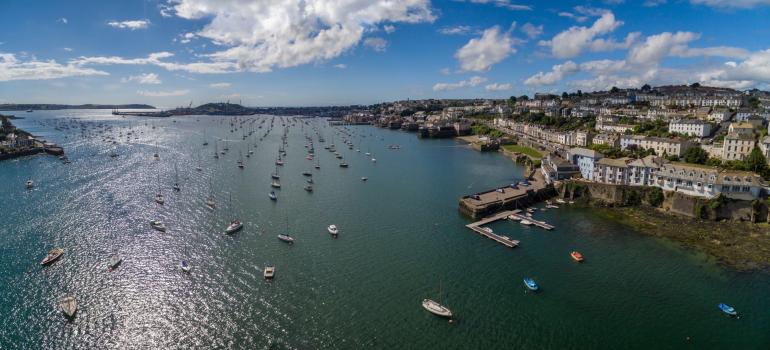
24 October 2023
A Falmouth Harbour wall that was sparse of wildlife is set to become a bristling habitat of marine flora and fauna due to the installation of ‘habitiles’ designed to increase biodiversity.
New “Habitiles” attached to the east wall of Cornwall Council owned, Church Street Car Park are designed to provide niche habitats for a wide variety of inter-tidal marine species, helping to increase and maintain biodiversity in the heart of the harbour.
Falmouth Harbour has been working with Cornish environmental charity Our Only World in partnership with Falmouth Town Council and ARC Marine – a British company providing environmentally friendly solutions to the marine industry.
“A flat harbour wall doesn’t have the nooks and crannies which attract a diverse marine habitat and this is what the tiles aim to replicate,” says Tina Robinson from Our Only World. “We’ll see seaweeds and algae making their home here which then provide shelter and food for small invertebrates which in turn become a food source for larger animals.”
The textured tiles designed by ARC Marine (recently nominated for the prestigious Earth Shot prize) are made locally in Truro, Cornwall utilising the waste by products from the granite and quarrying industries. ARC Marine’s concrete has 91% reduced emissions when compared with Ordinary Portland Cement (OPC) and will soon be certified carbon neutral. They have also been certified to ensure they do not leach any toxic material into the environment and do not contain any plastics or steel reinforcement which can lead to concrete degradation once exposed to seawater.
Julian Chenoweth Manufacturing Director ARC Marine says “ARC Marine are proud to be delivering our products so close to our manufacturing facility and to showcase our innovations in providing a bespoke solution for the installation’s objectives. This project has already been a great learning experience in designing habitat enhancing features on existing sea walls and what species may benefit from rising and falling tides. We can’t wait to see the colonisation of marine organisms in the coming months and to improve these designs further on a much larger scale!
In March this year an ecological survey of the harbour wall was completed to establish a baseline level for biodiversity, with an aim to repeat this process again next year to monitor whether biodiversity increases.
“This is such an exciting project as we thoroughly expect the sea wall to go from a fairly barren expanse to a complex area hosting a greater variety of species,” says Falmouth Harbour’s Environment Manager Vicki Spooner. “And this gives us a great opportunity to work with local schools, colleges and universities to monitor the colonisation of these structures and develop survey skills.
“We’re really grateful to Our Only World and their funders Sea-Changers and the Matthew Good Foundation for facilitating this installation and we can’t wait to find out more about how these tiles can help to increase biodiversity within our harbour.”
There are eight similar living wall projects elsewhere in the world including one recently installed in Plymouth, four in Australia, while Newlyn in West Cornwall has a slightly different project underway involving textured blocks which create a type of reef in the harbour. After Falmouth, Our Only World will also be installing tiles at Mevagissey and Port Issac– and the charity hopes to spread living walls right around the UK coastline.
For information on the Living Wall project and Falmouth Harbour’s other environmental initiatives visit www.falmouthharbour.co.uk/environment and for more about the work of Our Only World see www.ouronlyworld.org.uk.

